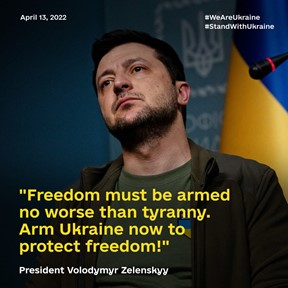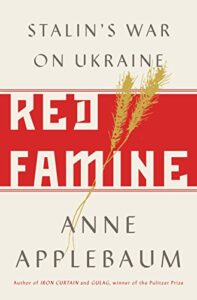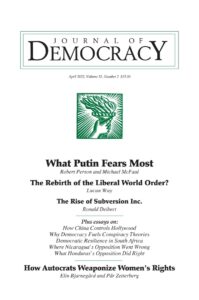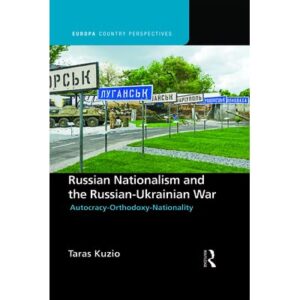 What has happened in Ukraine provides “a valuable lesson” for the world’s democracies, argues Francis Fukuyama, the Olivier Nomellini Senior Fellow at Stanford University’s Freeman Spogli Institute for International Studies and a faculty member at its Center on Democracy, Development, and the Rule of Law.
What has happened in Ukraine provides “a valuable lesson” for the world’s democracies, argues Francis Fukuyama, the Olivier Nomellini Senior Fellow at Stanford University’s Freeman Spogli Institute for International Studies and a faculty member at its Center on Democracy, Development, and the Rule of Law.
“When you live in a liberal democracy that is peaceful and prosperous, many people take that for granted and think there are no real threats to it,” he tells Salon.com. But a victory for Russia in Ukraine would bolster a global “network of anti-democratic forces” that extends into the advanced liberal democracies, he warns.
It has become apparent that “the West”, as a geopolitical concept, is no longer defined by geography. American allies in Asia, including Japan, South Korea, Singapore and Australia, have joined in the sanctions effort against Russia and when these advanced democracies work together they still easily account for more than half the world economy, notes FT analyst Gideon Rachman.
 But it is also dawning on the West that the idea that the whole world is united in condemnation of Russian actions is demonstrably false, he adds, especially the stance taken by such democracies as India and South Africa.
But it is also dawning on the West that the idea that the whole world is united in condemnation of Russian actions is demonstrably false, he adds, especially the stance taken by such democracies as India and South Africa.
India is not merely refraining from criticizing Russia but increasing its purchases of Russian oil, The Economist adds. Democracy itself may argue for staying on the fence: “pulling the lion’s tail” by refusing America or Britain plays well with the domestic audience.
The West shares with Ukraine a conception of liberty that isn’t based on race or heritage but inalienable rights. No tyrannical force must ever be allowed to destroy this profound link, and Mr. Putin invaded Ukraine with the goal of erasing the identity of its people, much as Joseph Stalin hoped to do in 1932-33, when he murdered as many as 10 million Ukrainians through starvation in the atrocity known as the Holodomor. Such horror defined the last century. It can’t be allowed to define this one, they write for The Wall Street Journal.
Putin’s invasion of Ukraine may bring about a “Rebirth of the Liberal World Order,” writes Lucan Way in the Journal of Democracy’s just-released April 2022 issue, available for free on Project MUSE through May 15. The worst European war in decades has already produced renewed unity in the West and could ultimately strengthen democracy in Europe and beyond.
 Putin has used the prospect of Ukraine joining NATO as a pretext for the Russian invasion. But in their essay, “What Putin Fears Most,” Robert Person and Michael McFaul argue that it is a flourishing democracy on Russia’s border that most worries the Russian dictator.
Putin has used the prospect of Ukraine joining NATO as a pretext for the Russian invasion. But in their essay, “What Putin Fears Most,” Robert Person and Michael McFaul argue that it is a flourishing democracy on Russia’s border that most worries the Russian dictator.
A joint Chicago Council-Levada survey finds that an overall majority of Russians support their government’s action in Ukraine. Fifty-three percent strongly support, and 28 percent somewhat support, the military operation. Just 14 percent oppose the military operation, and an additional 6 percent decline to respond, the survey observes:
For the most part, Russians think these actions are being taken to protect and defend fellow Russians and Russian speakers in Ukraine, to protect Russia itself, or to “denazify” Ukraine—story lines that have been amplified by the Russian government’s media apparatus. But as the conflict drags on, it may become more difficult to sustain this support, especially as the casualty rates are uncovered and the economic repercussions of the Western sanctions begin to more seriously affect Russian households.

Levada
In the current Council-Levada survey, large majorities express unfavorable opinions of NATO (78 percent), the United States (73 percent, up from 55 percent in February), and the European Union (68 percent, up from 48 percent in February). Eighty percent oppose Russia’s making concessions to Western counties to lift sanctions, Dina Smeltz and Lily Wojtowicz write for The Post.
When you are told that no one protests against the war in Russia, don’t believe it, notes Vladimir Kara-Murza. Hundreds of people who took part in such protests are imprisoned in police stations and special detention facilities. The police grab them immediately and take them away. And there are no more media outlets in Russia that can talk about it, he writes for The Post:
 There are many “politicals” — people targeted for political reasons — doing time in Russia right now. Even in the Khamovniki police station, where I spent the first day after my detention in a stone box measuring 2-by-3 meters, I met two young women in neighboring cells who had been picked up for writing antiwar graffiti. Among the inmates in the special detention center are a young man and woman who had staged a protest in response to the murders in Bucha, Ukraine. There are also students of the Higher School of Economics who were detained for an antiwar demonstration. And these are only those whom I myself saw in two days in two places in Moscow.
There are many “politicals” — people targeted for political reasons — doing time in Russia right now. Even in the Khamovniki police station, where I spent the first day after my detention in a stone box measuring 2-by-3 meters, I met two young women in neighboring cells who had been picked up for writing antiwar graffiti. Among the inmates in the special detention center are a young man and woman who had staged a protest in response to the murders in Bucha, Ukraine. There are also students of the Higher School of Economics who were detained for an antiwar demonstration. And these are only those whom I myself saw in two days in two places in Moscow.
“@vkaramurza is among the most inspiring, courageous & optimistic individuals I know,” said National Endowment for Democracy President & CEO Damon M. Wilson. “Because of so many like VKM, Russia has a better future,” he tweeted.
Following Ukraine’s 2004 Orange Revolution, the Kremlin embraced conservative nationalism as a safeguard against any similar pro-democracy uprisings inside Russia, notes Taras Kuzio, a Research Fellow at the Henry Jackson Society and author of the recently published “Russian Nationalism and the Russian-Ukrainian War.”
 This led to the formation of groups such as “Nashi,” a virulently nationalistic pro-Kremlin youth group that was widely compared to the Hitler Youth. In addition to the aforementioned victory cult surrounding WWII, Putin has also elevated the role of the Russian Orthodox Church in national life and promoted the idea of Russia as a “distinct civilization,” he writes for The Atlantic Council:
This led to the formation of groups such as “Nashi,” a virulently nationalistic pro-Kremlin youth group that was widely compared to the Hitler Youth. In addition to the aforementioned victory cult surrounding WWII, Putin has also elevated the role of the Russian Orthodox Church in national life and promoted the idea of Russia as a “distinct civilization,” he writes for The Atlantic Council:
The international community must now urgently respond to the grave threat posed by Russian fascism before it is too late. This means dramatically escalating sanctions while providing Ukraine with the weapons it needs to defend itself. Vladimir Putin pretends to be “de-Nazifying” democratic Ukraine, but it is clearly Russia itself that requires “de-Nazification.” RTWT
It is dawning on the West that the idea that the whole world is united in condemnation of Russian actions in Ukraine is demonstrably false, notes the @FT‘s @gideonrachman – with the stance of democracies like India & S Africa especially worrisome https://t.co/RzUUEnpP1i
— Democracy Digest (@demdigest) April 18, 2022







